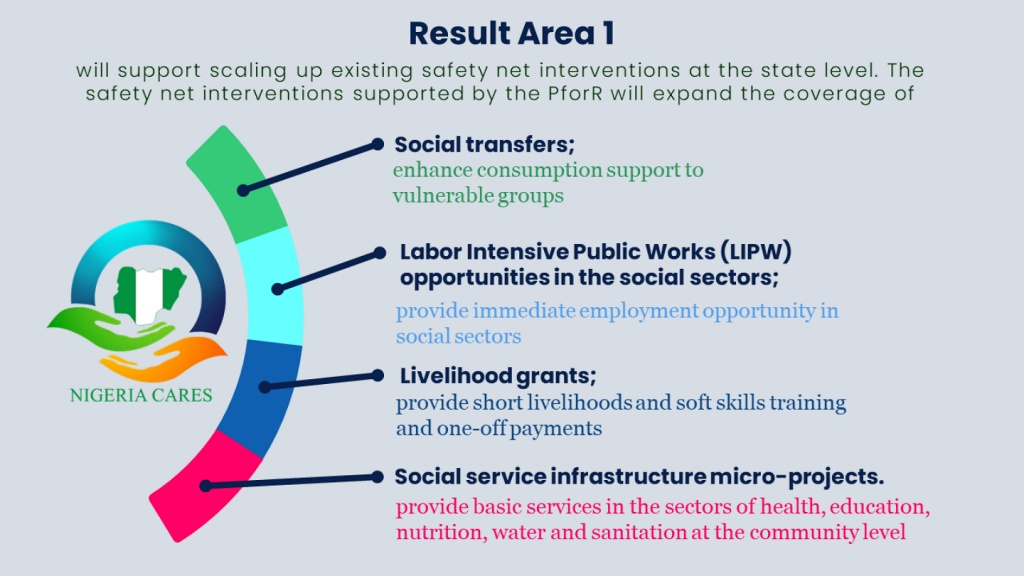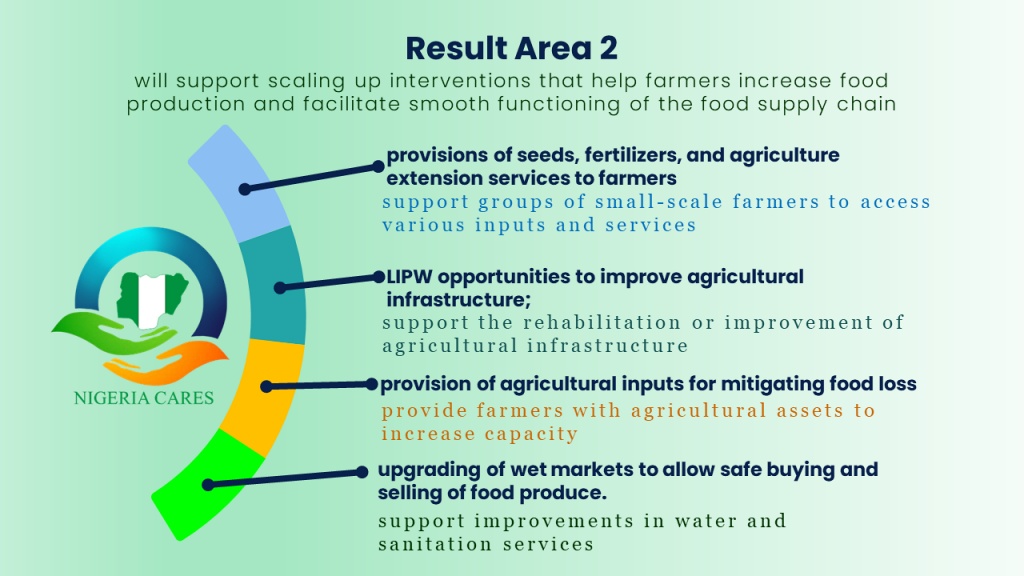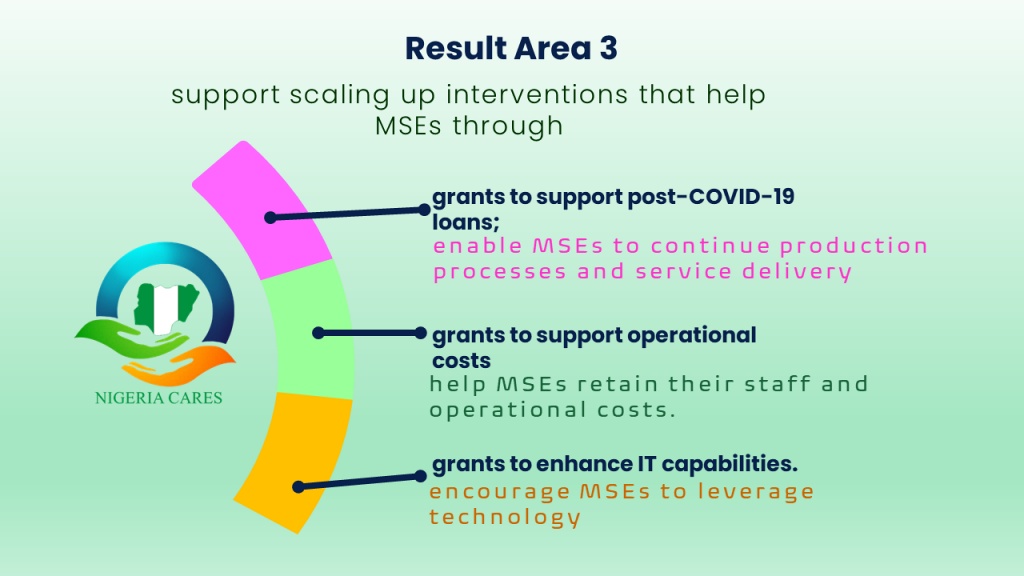NG-CARES Anchor Areas
The Project Development objectives (PDO) of NG-CARES is “To Expand access to livelihood support and food security services, and grants for poor and vulnerable households and firms.”
This is an emergency intervention Programme, anchored on three (3) Results Areas with eleven (11) Disbursement Linked Indicators (DLIs).

NG CARES is anchored on three Result Areas:
Results Area 1 aims to support the Government’s efforts in scaling up safety net services that provide consumption and livelihood support to the increasing number of poor and vulnerable households. Nigeria spends less on social safety nets programs than every other lower‐middle‐income country and most of its regional peers—around 2.6 percent of the GDP on the three social sectors(health, education, social protection) combined and 0.3 percent of the GDP on social safety nets. Despite several social protection programs being launched in the last few years, coverage of safety net programs remains alarmingly low. This is in direct contrast to the objectives laid out in the national‐level documents and despite evidence linking safety net programs to improved human capital outcomes for the poor in the country. Recently, however, several initiatives have been under way to reduce fragmentation among smaller ad hoc safety net programs, and to create an institutional structure at the federal, state, and local government authority (LGA) levels to strengthen the coordination and implementation of interventions related to protecting the poor and the vulnerable. The CARES PforR provides an opportunity to continue the process of consolidation and capacity building of these interventions at the state level.
RESULT AREA 1: Increased social transfers, basic services, and livelihood support to poor and vulnerable households. This involves:

RESULT AREA 2: Increasing food security and safe functioning of food supply chains for poor households. This is agriculture related activities across the entire Agriculture value chain such as:
This Results Area aims to support government interventions that mitigate the impacts of the COVID‐19 pandemic on food security of the poor and vulnerable households and facilitate the safe functioning of food supply chains. The main impacts of the pandemic on food security and food supply chains include the following: (a) increase in consumer price of major food commodities due to reduced availability;26 (b) disruptions to the input delivery networks have reduced availability of various crop and livestock inputs and increased their prices; (c) disruptions to food supply chains have created a wedge between smallholder poor farmers and the markets, leading to low farmgate prices received by farmers, increased food loss and waste at the farm level, and high food prices to consumers; (d) reduced operations of wet food markets—as part of measures to contain the spread of the virus—have affected incomes of poor farmers who sell produce in wet markets and reduced food availability to poor buyers who often rely on the wet markets for supplies; and (e) reduced supply of on‐farm labor due to movement restrictions, social distancing, and fear of morbidity

RESULT AREA 3: Facilitating recovery and enhancing capabilities of MSEs
Results Area 3 aims to support government programs that allow MSEs to resume activities that may have been hampered since the start of the COVID 19 pandemic. The pandemic has placed the MSE sector in Nigeria, a major contributor to the Nigerian economy—contributing to 50 percent of Nigeria’s GDP and about 85 percent to employment—under severe stress. The sector, which employs about 140–160 million people, is facing acute strain due to the disruption in the markets and supply chain. The sector was already grappling with low credit growth in 2019 and the early part of 2020, which has been further exacerbated by COVID‐19 and the phased national lockdown and various restriction measures across the country. Women‐owned firms may also be especially vulnerable to the adverse effects of the crisis given that even before the onset of the pandemic they faced more binding constraints than men in accessing capital and participating in higher value‐addition activities. Results Area 3 will selectively support government interventions that have potential to enhance the ability of local enterprises to fully resume economic activities during and potentially beyond the crisis period. Table 5 shows the three categories of government interventions that will be prioritized for CARES PforR support through Results Area 3 for MSE support. Access to cheaper financing, support on operational costs through limited time grants (for example, for utilities, staff costs), and business capability upgrading are government interventions that are broadly relevant for supporting MSEs to address the constraints posed by the current economic recession. These three areas of support are consistent with the response to COVID‐19 across many states in Nigeria where relevant MDAs including MSME support agencies of the state governments, Ministries of Commerce and Industry, and Ministries of Cooperatives are designing and implementing programs and initiatives on facilitating enterprise recovery and enhancing capabilities. Furthermore, Results Area 3 will prioritize government interventions in supporting three distinct categories of firms. These categories of firms are (a)survivalists: enterprises with fewer capabilities, productive assets, and negligible firm‐to‐market relationships; (b) constrained but motivated: enterprises with productive capabilities and meaningful firm‐to‐market relationships; and (c) growth oriented, resilient, top‐performers: enterprises with transformative capabilities and firm‐employee and buyer‐supplier relationships.




